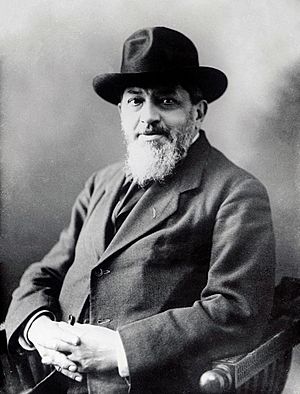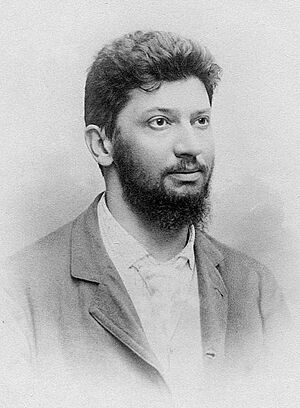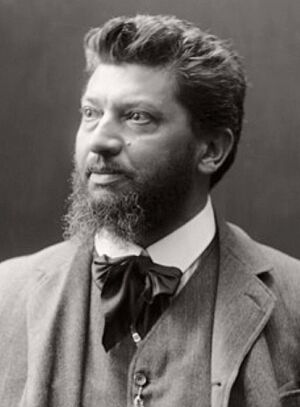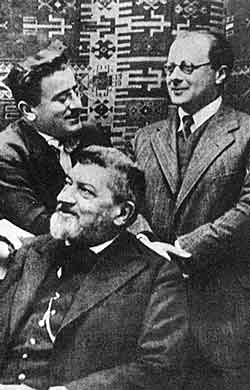Filippo Turati facts for kids
Quick facts for kids
Filippo Turati
|
|
|---|---|

Turati c. 1920
|
|
| Member of Chamber of Deputies | |
| In office 10 June 1895 – 9 November 1926 |
|
| Personal details | |
| Born | 26 November 1857 Canzo, Kingdom of Lombardy–Venetia |
| Died | 29 March 1932 (aged 74) Paris, France |
| Nationality | Italian |
| Political party | POI (1886–1892) PSI (1892–1922) PSU (1922–1930) |
| Domestic partner | Anna Kulischov |
| Occupation | Jurist, poet, journalist, politician |
Filippo Turati (26 November 1857 – 29 March 1932) was an important Italian thinker, writer, and socialist politician. He played a big role in creating the Italian Socialist Party and fought for workers' rights and democracy in Italy.
Contents
Early Life and Ideas
Filippo Turati was born in Canzo, a town in Italy, in 1857. He studied law at the University of Bologna and became a lawyer. When he was younger, he was part of a group of artists and writers in Milan called the Scapigliatura movement. He wrote poems, and one of his most famous was "Workers' Hymn" (Inno dei Lavoratori). This song became very popular among workers who were starting to organize and demand better conditions.
Turati became very interested in politics, especially in how society could be made fairer. He studied how social problems might lead to crime. During his work, he met Anna Kulischov, a smart woman from Russia who also believed in social change. They fell in love and worked together for the rest of their lives, sharing ideas and fighting for their beliefs.
Founding the Socialist Party
In 1886, Turati joined the Italian Workers' Party. He and Anna Kulischov were key figures in starting the Italian Socialist Party (PSI) in 1892. They believed in a type of socialism called "reformism." This meant they thought that changes to make society better for everyone should happen slowly and peacefully. They wanted to achieve their goals through actions in the Italian Parliament, by organizing labor unions, and by educating people.
They spread their ideas through a journal called Critica Sociale. This magazine was very important for sharing Marxist ideas in Italy before World War I. Later, it was shut down by Benito Mussolini's Fascist government, but it was restarted after World War II and is still published today.
In the years after the party was founded, the Italian government tried to stop the socialists. Turati believed that socialists should work with other democratic groups to fight against unfair government policies and to help left-wing causes. In 1898, Turati was arrested during a time of public unrest over rising bread prices. He was later set free.
Turati often encouraged socialist politicians to work with more moderate governments if it meant helping workers. For example, in 1901, he urged socialist members of Parliament to support the government of Prime Minister Giuseppe Zanardelli. This was a difficult decision, but it helped ensure that workers gained the right to strike, which led to better working conditions.
Over time, there were disagreements within the Socialist Party between those who wanted slow changes (like Turati) and those who wanted faster, more revolutionary changes. In 1912, the more revolutionary members took control of the party. Benito Mussolini, who would later become a dictator, became the editor of the party newspaper Avanti!. Turati disagreed with Mussolini, especially about Italy joining World War I. Turati was a pacifist and opposed the war, while Mussolini wanted Italy to join.
Fighting Against Fascism
After World War I, Mussolini created the National Fascist Party and came to power in Italy in 1922. Filippo Turati and Anna Kulischov were strong opponents of fascism. They lived under constant watch and threats because of their beliefs. Turati warned that the Fascist movement would have very serious consequences for Italy.
In 1921, the Italian Socialist Party split again, and a new group called the Communist Party of Italy was formed. In 1922, Turati's group was expelled from the PSI, and they formed a new party called the Unitary Socialist Party (PSU).
A sad event happened in 1924 when Giacomo Matteotti, a close friend and leader of Turati's party, was killed by Mussolini's secret police. This terrible event led Mussolini to make his rule even stronger, turning Italy into a dictatorship between 1925 and 1926.
In 1926, Turati had to escape from Italy to France because of the dangers he faced. Many brave people helped him, including Sandro Pertini, who later became the President of the Italian Republic. In Paris, Turati continued to lead the non-Communist anti-fascist movement. He traveled around Europe, telling people about the dangers of fascism. He passed away in Paris in March 1932.
After World War II, Turati's body was brought back to Milan and buried next to Anna Kulischov at the Cimitero Monumentale.
In the 1973 film The Assassination of Matteotti, Filippo Turati was played by actor Gastone Moschin.
Images for kids
See also
 In Spanish: Filippo Turati para niños
In Spanish: Filippo Turati para niños
 | John T. Biggers |
 | Thomas Blackshear |
 | Mark Bradford |
 | Beverly Buchanan |





